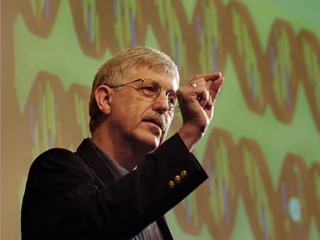
Francis S. Collins biography
Date of birth : 1950-04-14
Date of death : -
Birthplace : Staunton, Virginia, United States
Nationality : American
Category : Science and Technology
Last modified : 2010-07-16
Credited as : Physician and geneticist, discoveries of disease genes, leadership of the Human Genome Project (HGP)
2 votes so far
Francis S. Collins is the Director of the National Human Genome Research Institute at the National Institutes for Health. Born in Staunton, Virginia, Collins was raised on a small farm and home-schooled until the sixth grade. Collins obtained his undergraduate degree in chemistry at the University of Virginia in 1970, and went on to obtain a Ph.D. in physical chemistry at Yale University in 1974. Recognizing that a revolution was beginning in molecular biology and genetics, Collins changed fields and enrolled in medical school at the University of North Carolina, where he encountered the field of medical genetics, earning his M.D, in 1977. After a residency and chief residency in internal medicine in Chapel Hill, Collins returned to Yale for a fellowship in human genetics, where he worked on methods of crossing large stretches of DNA to identify disease genes. Collins continued to develop these ideas after joining the faculty at the University of Michigan in 1984. This approach, for which he later coined the term "positional cloning", has developed into a powerful component of modern molecular genetics, as it allows the identification of disease genes for almost any condition, without knowing ahead of time what the functional abnormality might be.
Together with Lap-Chee Tsui and Jack Riordan of the Hospital for Sick Children in Toronto, Canada, Collins' research team identified the gene for cystic fibrosis using this strategy in 1989. That was followed by his group's identification of the neurofibromatosis gene in 1990, a successful collaborative effort to identify the gene for Huntington disease in 1993, and the identification of the gene for multiple endocrine neoplasia type I (MEN1) in 1997. In 1993, Collins accepted an invitation to become the second director of the National Center for Human Genome Research, following in the footsteps of James Watson. In that role, Collins has overseen the full sequencing of the human genome.
In addition, Collins founded a new NIH intramural research program in genome research, which has now grown to become one of the premier research units in human genetics in the United States. His own research laboratory continues to be vigorously active, exploring the molecular genetics of breast cancer, prostate cancer, adult-onset diabetes, and other disorders. Collins' accomplishments have been recognized by election to the Institute of Medicine and the National Academy of Sciences, and numerous national and international awards.
Collins enjoys riding motorcycles and playing guitar. He is well-known for trying new things, sometimes risking his own physical well-known. In an international human genetics meeting, Collins told an audience of 5000 that he had recently injured his back trying to roller-blade. He explained, "This is what happens when you are 44 years old, but you think you are 22, and end up feeling you are 66".
UPDATES
August 4, 2005: It was announced that Collins will receive the American Society of Human Genetics (ASHG) Allan Medal "for his contributions to the identification of the genes that carry mutations which cause, for example, neurofibromatosis and progeria, for the design of strategies for the identification of other major disease-causing mutations, such as cystic fibrosis and Huntington's disease, and for his roles in promoting and explaining human genetics research in the public forum." The award, which includes a medal and $10,000, will be given to Collins during the ASHG annual meeting in Salt Lake City, Utah, in late October of 2005.
April 8, 2008: It was announced that Collins was selected as the recipient of the inaugural Inamori Ethics Prize from the Inamori International Center for Ethics and Excellence at Case Western Reserve University. The honor will be presented at a ceremony on September 4, 2008, on the university's campus.
July 8, 2009: President Barack Obama nominated Collins to become the head of the National Institutes of Health.
September 18, 2009: It was announced that Collins will be honored with the National Medal of Science. The award will be presented at a ceremony at the White House on October 7, 2009.
February 15, 2010: Collins was honored with the 2009 Philip Hauge Abelson Award from the American Association for the Advancement of Science.
















